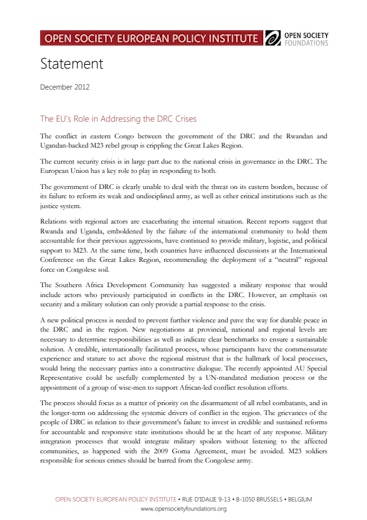The conflict in eastern Congo between the government of the Democratic Republic of the Congo (DRC) and the Rwandan and Ugandan-backed M23 rebel group is crippling the Great Lakes Region.
The current security crisis is in large part due to the national crisis in governance in the DRC. The European Union has a key role to play in responding to both.
The government of DRC is clearly unable to deal with the threat on its eastern borders, because of its failure to reform its weak and undisciplined army, as well as other critical institutions such as the justice system.
Relations with regional actors are exacerbating the internal situation. Recent reports suggest that Rwanda and Uganda, emboldened by the failure of the international community to hold them accountable for their previous aggressions, have continued to provide military, logistic, and political support to M23. At the same time, both countries have influenced discussions at the International Conference on the Great Lakes Region, recommending the deployment of a “neutral” regional force on Congolese soil.
The Southern Africa Development Community has suggested a military response that would include actors who previously participated in conflicts in the DRC. However, an emphasis on security and a military solution can only provide a partial response to the crisis.
A new political process is needed to prevent further violence and pave the way for durable peace in the DRC and in the region. New negotiations at provincial, national and regional levels are necessary to determine responsibilities as well as indicate clear benchmarks to ensure a sustainable solution. A credible, internationally facilitated process, whose participants have the commensurate experience and stature to act above the regional mistrust that is the hallmark of local processes, would bring the necessary parties into a constructive dialogue. The recently appointed African Union (AU) Special Representative could be usefully complemented by a UN-mandated mediation process or the appointment of a group of wise-men to support African-led conflict resolution efforts.
The process should focus as a matter of priority on the disarmament of all rebel combatants, and in the longer-term on addressing the systemic drivers of conflict in the region. The grievances of the people of DRC in relation to their government’s failure to invest in credible and sustained reforms for accountable and responsive state institutions should be at the heart of any response. Military integration processes that would integrate military spoilers without listening to the affected communities, as happened with the 2009 Goma Agreement, must be avoided. M23 soldiers responsible for serious crimes should be barred from the Congolese army.
The European Union is in a position to support the establishment of this process and re-assess its own immediate, medium and longer term responses.
The Open Society Foundations recommend that the EU and its Member States immediately:
- work with the international community to develop this new, high-level conflict resolution process;
- call on the United Nations Security Council to request the Secretary-General immediately appoints a Special Envoy or “Wise-men” Panel;
- condemn, in unequivocal terms, Rwanda, Uganda and the M23 for their actions;
- fully endorse and apply restrictive measures (sanctions) against all the individuals identified in the Group of Experts report as having violated the U.N. arms embargo on the Congo. This includes the Rwandan military and political officers who support and direct the M23;
- suspend bilateral aid programs that are not explicitly directed to the humanitarian needs of the Rwandan and Ugandan civilian population; and
- demand that for as long as Rwanda is in breach of its international peace and security responsibilities, it is not allowed to take its non-permanent seat at the UN Security Council (effective from January 2013).
In the medium term, the EU’s relationship with the DRC needs to be recalibrated. This should start from demanding concrete signs of good will from Kinshasa in the areas of governance, democracy, transparency and the rule of law. This could include the establishment of a functioning national Security Sector Reform coordinating body; and steps to fight impunity, including with General Numbi’s arrest and full cooperation with the International Criminal Court on the Bosco Ntaganda case.
In the longer term, the EU must develop, in partnership with the DRC, clear progress benchmarks on the following:
- the fight against corruption and the promotion of transparency in the management of the national resources (for instance with the establishment of an independent citizens’ observatory of the national budget);
- reform of the Independent National Electoral Commission (CENI) and the organisation of credible provincial and local elections;
- full implementation of the decentralisation measures included in the Congolese constitution, and the fiscal empowerment of provincial and local State officials mandated to serve the population;
- respect for human rights and the reform of the justice system; and
- full respect for freedom of expression and opinion backed up by the necessary supporting laws.
Download
-
The EU’s Role in Addressing the DRC Crises (93.35 Kb pdf file)
Download the full statement.
Read more
Voices
Blood Stains Rwanda’s Seat in the UN
The EU could and should do more to hold Rwanda to account for fuelling the conflict in the Democratic Republic of Congo.
Voices
Security Sector Reform in the Democratic Republic of Congo: An Interview with Marta Martinelli
For people in the DRC, ensuring a well-trained and regularly paid army means the difference between being able to fetch wood or walk to school safely rather than being harassed, raped, or forced to do labor by soldiers along the way.
